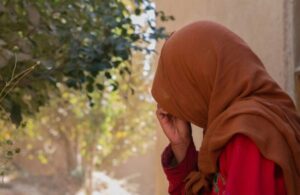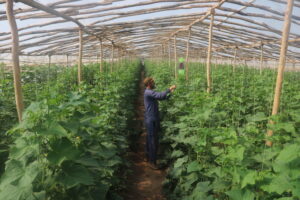KABUL (SW) – Salam Watandar’s findings from interviews with 21 women who work in active fields for women show that the monthly income of 18 has decreased.
Notably, two women, a doctor and the other a journalist, say that their income remains stable, but there is a delay in its payment. Only one female doctor reports that no change has come in her monthly allowance.
Of the interviewed group of 21 women, eight are in education, five in health, five in media, and three in the industry and commerce sector. Among all, six of them working in governmental institutions have experienced a decrease in their monthly income, though they do not share the reasons for this decline.
On the other hand, another 15 of these women work in private institutions or are self-employed, the income of 12 of them has decreased, and the wages of the other two are not paid on time. They consider the failure of markets and economic problems in the institutions they work for, as the reasons for the decrease in their income.
In this report, among the women interviewed, eight are employed in the education sector; three of them work in public schools, while the remaining five are employed in private schools. It is noteworthy that all these women have experienced a decrease in their income.
Nouriya Ahmadi, a teacher at Hazrat-e Ali Public School, says that 2,000 Afghanis have been cut from her monthly salary. “I taught at Zainab Kobra High School, where there were 12th-grade girls, and now I teach at Hazrat-e Ali High School. I have a master’s degree, and 2,000 Afghanis have been cut from my salary,” She added.
Fazela Ahmadi, another teacher who has taught 6th-grade boys in the Ghabelbay high school during the republic rule and now is a teacher in one of the private schools for a salary of 4,000 Afghanis, says: “In the current government, females face many problems and challenges; because in the previous regime, all female teachers could teach at any time and any school, whether male or female; but now, girls can only learn up to the sixth grade. Thus most of the women have become unemployed.”
Naziya Ahmadi, Fereshta Rahmani, Homa Ahmadi, and Zahra, teachers in private schools, along with Forohal and Maryam Jafari, teachers in public schools, have shared their experiences regarding a reduction in their monthly salaries and work-related constraints.
Additionally, this report includes insights from five women employed in the health sector. Three of them noted a decrease in salary, one reported a delay in salary payment, and only one mentioned a significant alteration in both salary and its payment timeline.
Maria Azizi, a surgeon at Rabia Balkhi Hospital, says: “Doctors are facing a lot of problems in terms of gender. All parts are irregular; both patients doctors and nurses have had problems. Institutional contributions have decreased, salaries for doctors and nurses have decreased.”
Atefa Barakzai, an obstetrician-gynecologist at one of the private clinics in Herat, also says: “There have been many changes in the state of works during the republic. The women, who work, come to us and complain about the bad economic situation, they do not have income and jobs, and their economic situation affects our economic situation; because they do not have money and cannot pay their fees in full. Unfortunately, the number of visits is very low; because they don’t have money.”

Furthermore, this report includes interviews with five female journalists. Among them, three reported a decrease in their income, while one mentioned having no income at all. Another interviewee stated that although the amount of their salary has remained unchanged, it is not paid on time.
One of the journalists, who does not want to be named in the report, says: “I was the one who worked in the Meshrano Jirga/Senate during the republic. I used to work in the journalism department there. It is clear that someone who works there had at least 20,000 Afghanis salary, but now I work free in a media outlet.”
Another journalist, who does not want to be named in the report, also says: “There have been lots of differences in the income sector in the media. If I tell the difference between the current and the previous income, the difference is huge. At that time, my income was very high.”
“The income we had during the republican rule was by far a good income; but even though in the network where I work, there is no problem in my income; there has been a delay in its payment. One month later, two months later, we can get a living wage, which was not the case before,” said Soman Rahmati, a reporter for “Noor” TV.
The Ministry of Industry and Trade stands out as one of the active sectors for women; however, three female industrialists and business professionals have reported a decrease in their income and job opportunities.
Wahida Sultani, a businessperson, says: “It used to be prosperous; the business environment was thriving, with opportunities for everyone, and our store was exclusively feminine. Our sales were thriving. However, with the closure of women’s stores, our sales have plummeted. We are currently grappling with a lack of sales, and now we find ourselves covering the store rent from our own pockets.”
Bibi Shirin, an industrial woman, adds: “Business thrived in the past; women were active, financially capable, and engaged in work. They used to visit and make purchases. However, presently, many less fortunate women are confined to their homes. They’ve been restricted from offices, leading to a lack of income, resulting in a noticeable decline in buying and selling.”
Amidst these challenges, women’s rights activists are fervently advocating for the reduction of restrictions on women and an increase in the salaries of female employees in both governmental and non-governmental institutions. They emphasize that women play a pivotal role in families, emphasizing the importance of timely and equitable compensation aligned with their capabilities and workload.
Mahjuba Habibi, a women’s rights activist, says: “There are very few women who are active in society, such as journalists, teachers and doctors that face very challenges when they go for duty. Our desire is to remove these challenges.”
Sahar Rezaei, another women’s rights activist, emphasizes, “Let the voices of Afghan women be heard, envision a promising future for them, ensure their rights, and place significant focus on the health sector—support our doctors.”
Despite these challenges, Zabihullah Mujahid, the spokesperson of the Islamic Emirate, acknowledged in an interview with Salam Watandar that there has been a reduction in the salary of female employees in de-facto government sectors. He added that this reduction is in line with the current financial constraints faced by the government, affecting the salaries of all government employees based on a specified percentage.
“The salaries of all government employees, across the board, were initially reduced and have since remained unchanged. A certain percentage was cut, reflecting the necessity of the situation. In the past, there were ample resources, resulting in higher wages. However, with changing circumstances, the possibilities have shifted. Therefore, at the outset of the Islamic Emirate of Afghanistan, salaries were reassessed and aligned with the people’s current needs,” said Mujahid.
Despite female employees in active women’s sectors reporting decreased incomes, the de-facto government of the Islamic Emirate views women’s work in these sectors as current achievements for the country.
ENDS






